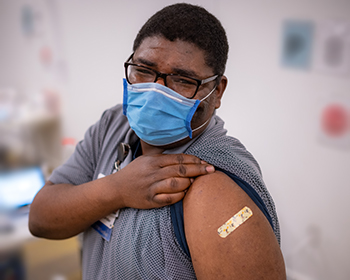This video is best viewed in Chrome or Firefox.
Millions of Americans have skipped getting the second dose of their COVID-19 vaccine, and the numbers are only growing.
According to the most recent data from the Centers for Disease Control and Prevention (CDC), nearly 8% of people who got one dose of the Pfizer or Moderna vaccines didn't get their second shots.
That's more than five million people.

UC Davis Health experts say it's important to get your second shot to maximize protection against COVID-19.
The reasons vary, from the misconception that one shot is sufficient to concerns about side effects.
According to Dean Blumberg, chief of pediatric infectious diseases at UC Davis Children's Hospital, the second dose is important for two main reasons.
- Getting a second vaccine dose boosts your immunity.
- Getting a second dose results in longer lasting immunity.
Researchers at Cornell University and Boston Children's Hospital found that 20% of Americans surveyed believed they were strongly protected after just the first dose. Another 36% said they didn't know the amount of protection the vaccines provided.
A recent study from the CDC looked at people 65 and older, finding that protection increased from 64% to 94% after full vaccination.
"Would you rather have 64% or 94% protection?" asked Blumberg. "94% sounds a lot better to me."
Another major reason some say they skipped getting the second dose? Concerns about side effects, which are more common after the second dose and may include fatigue, headache, muscle aches and fever.
Blumberg emphasizes that the side effects are "not that bad," especially when compared with the protection of being fully vaccinated. He said to remember that younger people are likely to have more adverse reactions to any immunization, not just the COVID-19 vaccines.
Some medical experts, including our nation's leading infectious disease expert Anthony Fauci, have said side effects are just a sign that your immune system is reacting properly to the vaccine and building protection.
"Whether you have side effects following vaccination or not, the vast majority of people are protected," said Blumberg.
Additionally, Blumberg cited Phase 3 studies of the vaccines, which showed 95% protection against the disease.
Some people have struggled to get their second dose at the same vaccination site or on the date scheduled for them.
Blumberg said the first issue is the supply catching up to the demand, but now with three vaccines and potentially more coming soon, the model is changing. Vaccine distribution started at mass vaccination sites and has shifted to commercial pharmacies. Soon, Blumberg said, the vaccines will make their way to doctor's offices. This could eliminate the access problem.
For those who aren't able to get their second dose on the exact given date, don't worry. The CDC said doses can be given up to six weeks apart. If it's longer, that's OK too, said Blumberg. It's truly better late than never, in this case.
"Even a month or two too late, we fully expect it to work just as well." said Blumberg.
Even if you're a couple months late, you won't have to restart your vaccine series. Whatever you do, advised Blumberg, just get your second dose.






